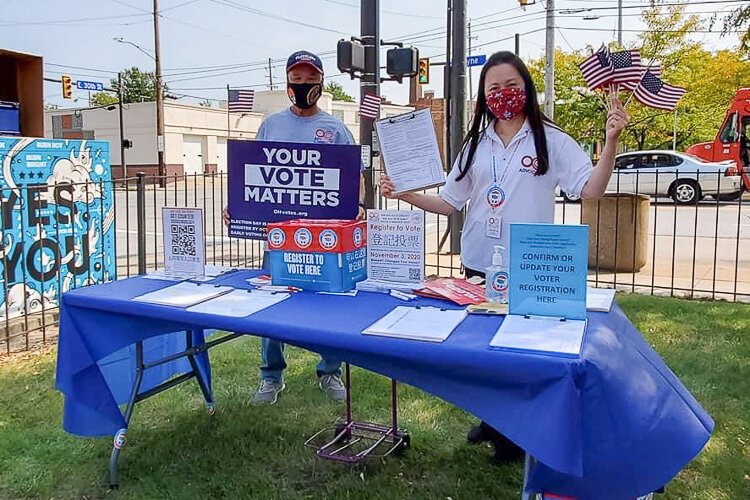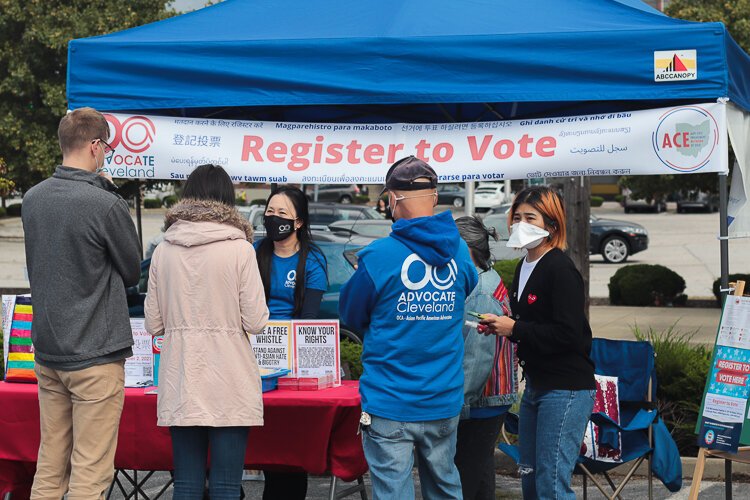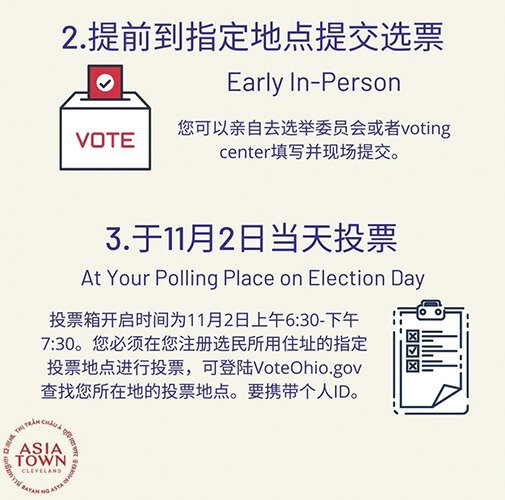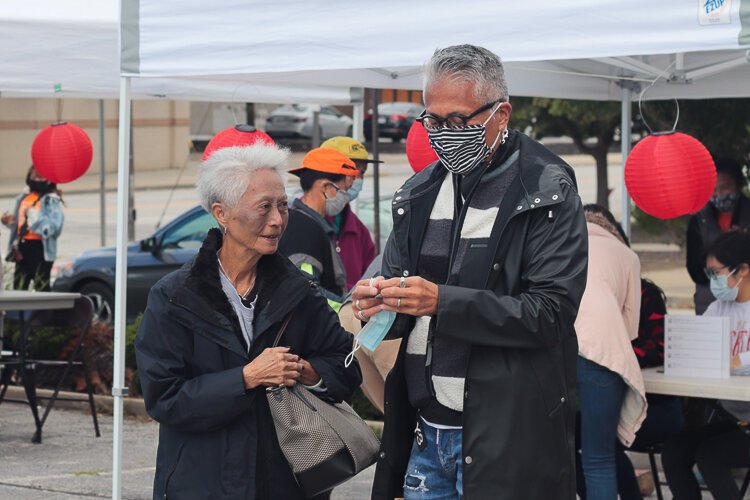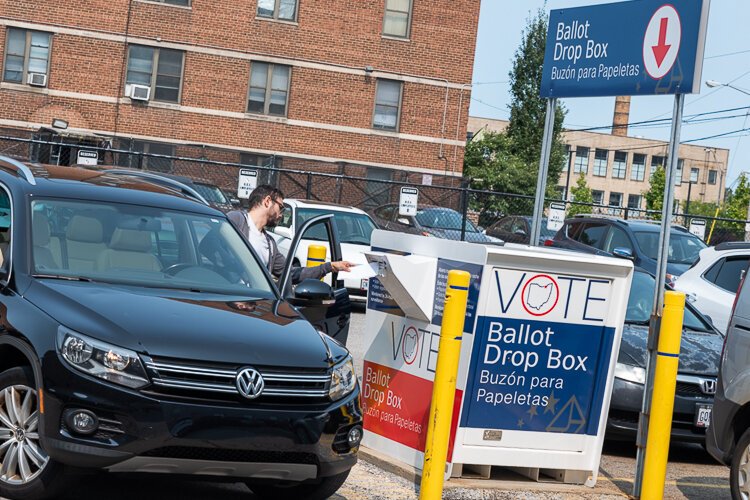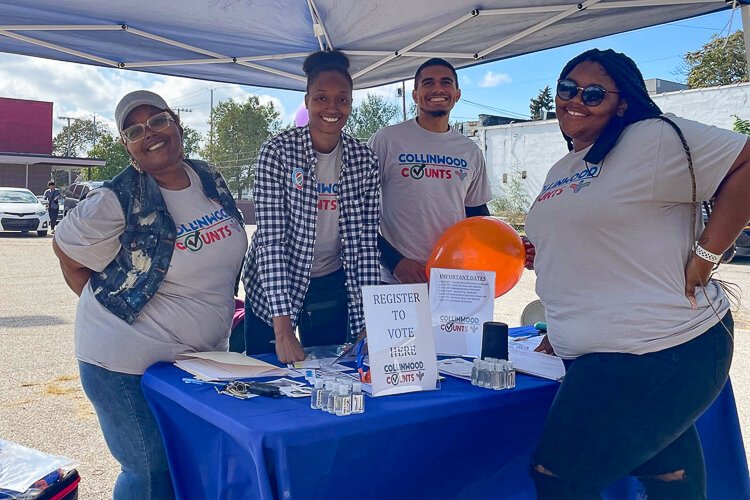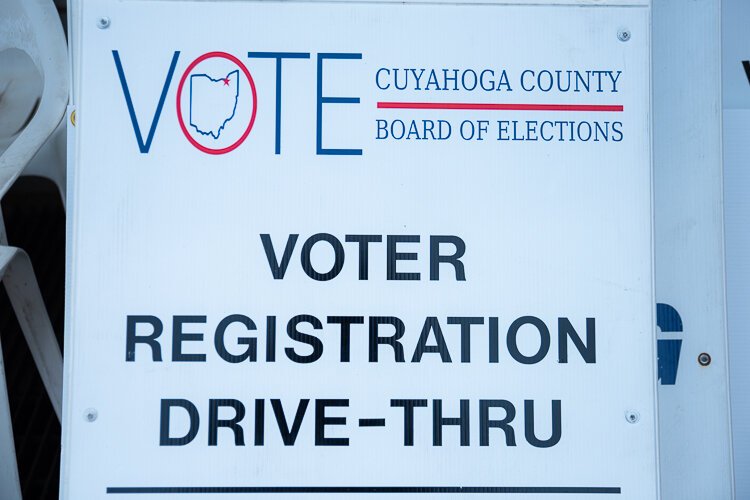Deeply engaged: How CDCs are knocking down barriers to voting on Tuesday
With two final candidates for the first new Cleveland mayor in 16 years on the ballot and more than half of the seats on city council up for grabs, both the upcoming election on Tuesday, Nov. 2, not to mention September’s primary, were always destined to represent a momentous cycle in the city’s history.
Like many nonprofits around Cleveland, Community Development Corporations (CDCs) recognized this importance several months ago and spent much of the year advocating for and encouraging residents in their neighborhoods to get involved in the election and voting processes.
It’s been a busy year. With less than one week until the big day, CDCs have no plans to take their collective feet off the gas. These groups are pulling out all the stops—from translating voting guides and hosting candidates forums, to voter registration and education drives and even free rides to the polls.
Here’s a look at what some CDCs are doing to make sure everyone votes next week.
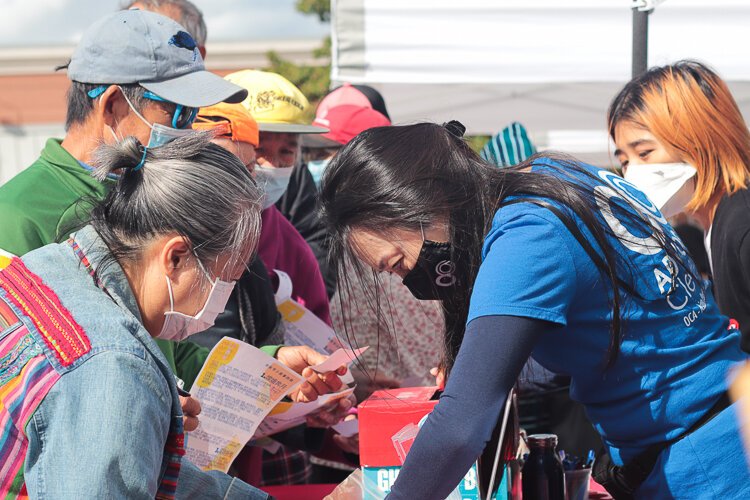 MidTown Cleveland Mid-Autumn Festival voter registration booth. The screenshots are relevant because they are from variousMidTown Cleveland, which has served the neighborhood of the same name for three decades, helped to promote OCA Greater Cleveland–Asian Pacific American Advocates [OCA]’s AsiaTown Candidate Meet and Greet forum at Li Wah Restaurant on Tuesday, Oct. 19, when Cleveland mayoral and Ward 7 council candidates to address issues important to the AsiaTown neighborhood and Asian community. The event was held in multiple languages, with Cantonese and Mandarin interpretations, to make sure every voice was heard.
MidTown Cleveland Mid-Autumn Festival voter registration booth. The screenshots are relevant because they are from variousMidTown Cleveland, which has served the neighborhood of the same name for three decades, helped to promote OCA Greater Cleveland–Asian Pacific American Advocates [OCA]’s AsiaTown Candidate Meet and Greet forum at Li Wah Restaurant on Tuesday, Oct. 19, when Cleveland mayoral and Ward 7 council candidates to address issues important to the AsiaTown neighborhood and Asian community. The event was held in multiple languages, with Cantonese and Mandarin interpretations, to make sure every voice was heard.
With so much at stake the CDCs know their residents’ voices and votes have the chance to impact the city for years to come.
“First and foremost, one of our roles in just working in the community is making sure that our communities are seen and heard,” says Karis Tzeng, director of AsiaTown Initiatives at MidTown Cleveland. “One of those ways is through voting and civic engagement. I think that underscores the importance of what we do for voter registration and education.”
Similarly, Cleveland Neighborhood Progress (CNP), the organization that operates in partnership with CDCs, businesses, and local government to improve the quality of life throughout Cleveland neighborhoods, hosted a candidate’s forum ahead of the primary election on Sept. 14 and issued its 2021 Neighborhood Platform—a four-priority document stating the various ways CDCs collectively envision working with the city’s next administration.
“The Neighborhood Platform also clearly articulates that CDCs are best positioned and qualified to be the primary mechanism to mobilize and strengthen Cleveland’s neighborhoods,” the document’s introduction reads. “Because of their reputations as trusted neighbors and resources for residents, small business owners, and other community stakeholders, CDCs have the unique ability to connect people with city services, personnel, community partners, and others.
“CDCs help deliver high-quality services and programs across the city, deep into every corner of every neighborhood,” the introduction continues. “Cleveland’s next Mayor and City Council should partner with CDCs and leverage their expertise, relationships, and ability to mobilize, with the goal of delivering transformative change in every Cleveland neighborhood.”
‘Something more accessible’
Tzeng says MidTown, which includes AsiaTown, spent the months leading up to this election cycle demystifying the political process and educating residents who do not have a voter history or may not primarily speak English. She says cultural barriers have served as a deterrent for some to register and/or vote.
“I think there’s a general sense of, ‘what is this doing for me,’” Tzeng says. “It’s not always clear to see the direct impact.”
The uniqueness of this cycle, which began with seven candidates vying for the top two spots in the September mayoral primary, only made things more confusing for some people.
“As someone who has the good fortune to be able to work in this realm, even I am sometimes having to backtrack and think things through and say, ‘what are the dates? What are the differences,’” says Tzeng.
MidTown monitored turnout in the organization’s precincts and general area to determine the areas to target for information dissemination and additional outreach. Ward 7 turnout was better than the 2017 primary, but still lower than MidTown officials hoped, Tzeng says.
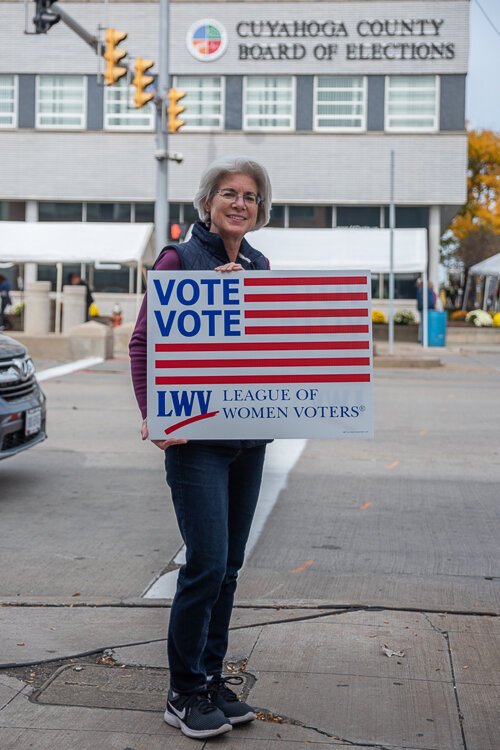 MidTown CDC took on the responsibility of translating the League of Women Voters of Greater Cleveland's voter guide to boost resident engagement.Heading into September, the CDC took on the responsibility of translating the League of Women Voters of Greater Cleveland's voter guide to boost resident engagement. With assistance from Cleveland VOTES and Asian Services in Action Inc.’s [ASIA Inc.] translation department, MidTown translated portions of the guide to Chinese that contained Ward 7’s election considerations.
MidTown CDC took on the responsibility of translating the League of Women Voters of Greater Cleveland's voter guide to boost resident engagement.Heading into September, the CDC took on the responsibility of translating the League of Women Voters of Greater Cleveland's voter guide to boost resident engagement. With assistance from Cleveland VOTES and Asian Services in Action Inc.’s [ASIA Inc.] translation department, MidTown translated portions of the guide to Chinese that contained Ward 7’s election considerations.
MidTown distributed the translations through WeChat, a Chinese social media platform, and put it on MidTown’s website to mitigate cultural barriers to the voting process.
“We were hearing from folks, ‘it can be hard to vote if I don’t know who the candidates are’ or, ‘if I don’t speak English, I don’t really know what it’s about,’” Tzeng says. “That really told us that while we put it out there, we need to push it out more—we wanted to make something more accessible.”
The hefty voter guide included information on various races and contained questions for the original seven mayoral candidates, as well as Ward 7 and 11 city council candidates. The guide marked the first time the organization had taken on the translation. The team distributed it at grocery stores, restaurants, and other places they know residents frequent. MidTown also used some of the content to create shareable graphics that were ideal for its WeChat, Twitter, and Instagram accounts.
“It helped us to be able to say, ‘here’s the question,’ and really put it out in bite-size content so that people could easily see that, share it, and consume it,” Tzeng says. “We share it with our other partners like OCA and ASIA Inc. so that they can also share it with their clients.”
MidTown also hosted a Mid-Autumn festival in September to promote voter education, registration, and information.
“We try to think of more creative ways to make voting a party,” Tzeng says. “We handed out sesame balls at the voter location at Sterling Recreation Center, and we tell [voters] to tell a friend. We just try to build excitement about the election.”
Partnering to engage voters
Cleveland VOTES, a nonpartisan nonprofit, stays busy throughout the election cycle by partnering with other organizations to inspire Cleveland’s low-income and hard-to-reach communities to increase voter participation with equitable civic engagement.
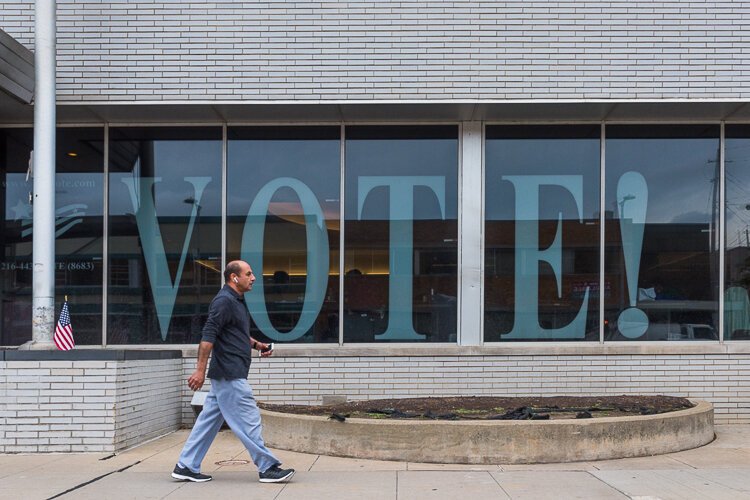 Cleveland VOTES also supports such organizations with grants with civic and voter engagement work. Cleveland VOTES cofounder Erika Anthony recognizes the value in working with a variety of organizations to engage with current and potential voters—ranging from health care systems to CDCs.
Cleveland VOTES also supports such organizations with grants with civic and voter engagement work. Cleveland VOTES cofounder Erika Anthony recognizes the value in working with a variety of organizations to engage with current and potential voters—ranging from health care systems to CDCs.
“Trying to think about who are the most trusted messengers in the community is really one of our driving values,” Anthony says. “This work is not homogenous. Residents of our communities are not a monolith.”
Cleveland VOTES issued a request for proposals earlier this year for grants, and a few CDCs applied for and received grants that have since been used to connect with residents and get them to the polls in September and November.
Greater Collinwood Development Corp. [GCDC], Tremont West Development Corp., Old Brooklyn CDC, and Bellaire Puritas Development Corp. were among the grantees. GCDC used part of its engagement dollars to host Cleveland Counts, a National Voter Registration Day celebration that offered registration and absentee ballot pledges to vote, along with COVID-19 vaccines, HIV testing, gift cards, and more with partners like Care Alliance Health Center and Everlasting Baptist Church.
For Cleveland VOTES, which is offering free rides to the polls through election day on Tuesday, Nov. 2, the measure of success in the ramp-up to the big day is not always focused on post-election data.
“The biggest note of success is the amount of different people [who] are engaged—the [number] of different places they’re in, different communities, different wards,” says Chynna Baldwin, civic engagement strategist for Cleveland VOTES. “I think that, really, is even more telling sometimes than even the numbers can be. The number of actual conversations that are had. There’s so many more ways for us to gauge how successful our events and outreach are that aren’t necessarily dependent on voter registration numbers.”
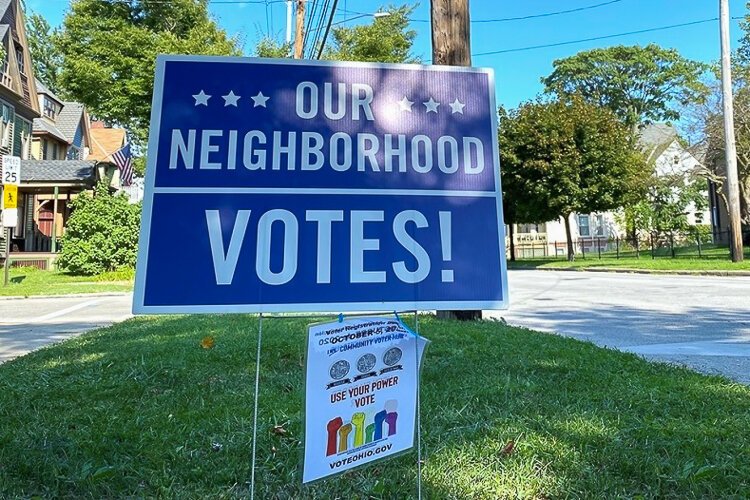 CDCs are best positioned and qualified to be the primary mechanism to mobilize and strengthen Cleveland’s neighborhoods.‘A day to jubilize’
CDCs are best positioned and qualified to be the primary mechanism to mobilize and strengthen Cleveland’s neighborhoods.‘A day to jubilize’
Encouraging participation in the political process has been an uphill battle for Famicos Foundation. In the Glenville, Hough, and St Clair-Superior neighborhoods that Famicos supports through neighborhood revitalization, affordable housing, and various social services, executive director John Anoliefo says his team has been trying to combat distrust from residents who aren’t used to voting or do not think they should be vote.
“They don’t believe they’re going to change anything,” Anoliefo says, “But they can,”
That’s the hopeful message Famicos workers have been trying to spread via handouts and at events this fall, including surprise pop-up events at prominent intersections in its neighborhoods.
The organization has increased its voter engagement in recent years, but Anoliefo says he has yet to overcome underwhelming results.
“It is not only difficult, it’s frustrating,” he admits. “It is [frustrating] because you are providing all of the tools, [including] education on why you should vote, what could change if everybody were to vote…. You give them the ballots, you go back to pick it up, and they are not there.”
He knows democracy, organizational funding, and much more are at stake, but he remains hopeful for greater involvement. Shortly after the primary, Anoliefo said Famicos aimed to knock on 1,000 doors and would even temporarily close some of its departments to make sure the outreach got done.
Anoliefo adds that the CDC is offering transportation to the polls via two vehicles to those who request rides by contacting Famicos at (216) 791-6476.
“A success for me for that day is that my bus driver comes back after 7 p.m. telling me how busy she was, that the buses were crowded and that was why she didn’t come back on time,” Anoliefo says. “A successful election day is when the phone is ringing off the hook and somebody says, ‘I need a ride to the polls, can you guys send somebody to pick me up?’ That would be different.
“That will be a day to jubilize.”
This story is part of FreshWater’s series, Community Development Connection, in partnership with Cleveland Neighborhood Progress and Cleveland Development Advisors. The series seeks to raise awareness about the work of 29 Community Development Corporations (CDCs) as well as explore the efforts of neighborhood-based organizations, leaders, and residents who are focused on moving their communities forward during a time of unprecedented challenge.
.jpg)

